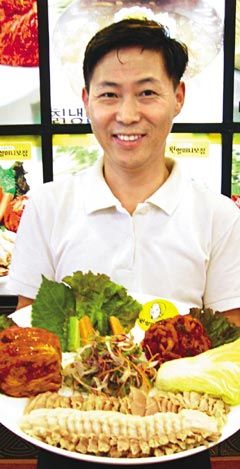(Small businesses) "Korean type" fast food places
In a Chosun Ilbo infomercial we are told that Korean type fast food places are gaining in popularity, as they provide a quick eat for Korean tastes. I have no way of knowing how well this matches the reality, but promoting fast foods based on the Korean diet sounds like a good idea. (Just think about how tasty a good bowls of mixed grain rice and toenjang stew were after subsisting for some three days on the hefty Czech menu...) These seem to be examples of "Koreanizing" the small business (or fast food) modernity, to put in an unnecessary complex terms. The idea with these businesses is that they are easy to operate, "just following the recipe", and thus do not require a lot of skil. And one important detail in the two cases of franchise shops that are introduced is that they both are former wage-earners in white-collar occupations. It looks as if they gave up their positions voluntarily and started the businesses, but I'm not sure. I don't dare to say that the status distinctions between fairly well-paid white-collar occupations and low-skilled ("non-professional") small businesses have diminished that much, but at least there has for a longer time been a tendency to "professionalize" many small business types. "This and this kind of a restaurant can also be a venture (벤처)", and so on. And the use of chônmunjôm to mean a specialty shop. These seem to be examples of "Koreanizing" the small business (or fast food) modernity, to put in an unnecessary complex terms. The idea with these businesses is that they are easy to operate, "just following the recipe", and thus do not require a lot of skil. And one important detail in the two cases of franchise shops that are introduced is that they both are former wage-earners in white-collar occupations. It looks as if they gave up their positions voluntarily and started the businesses, but I'm not sure. I don't dare to say that the status distinctions between fairly well-paid white-collar occupations and low-skilled ("non-professional") small businesses have diminished that much, but at least there has for a longer time been a tendency to "professionalize" many small business types. "This and this kind of a restaurant can also be a venture (벤처)", and so on. And the use of chônmunjôm to mean a specialty shop.The two examples: • Possam restaurant, started by a man after 20 years of working in a bank (and after 15 days of training). Invested 300 million W (200 000 €), of which 200 million is rent guarantee and kwôlligûm guarantee, but is confident that the place will do well. Monthly sales 50 mil., and net profit 10 mil. (6700 €) a month. (If this is correct, at least it shows that there is a potential for a very good income - as well as chance of going bust.) • "Galleria-type" punsik restaurant, opened by a 37-year old man after 10 years of wage earning. I'm not sure what is exactly a "cafeteria type" is here, but it should show that the place is different from an older kind of shabby and "undeveloped" punsik restaurant. (Punsik (粉食) should literally mean "flour foods" in distinction from meals with rice, but at least most of the punsik places in my neighborhood had also rice-based dishes.) - Opening expensis for the 50 sq.m shop were 140 million W (93 000 €), of which the kwôlligûm 80 million. Monthly sales 16 million, and net profit 6 mil. W (4000 €).  The possam and chokpal places are frontrunners in the Korean-style ad leaflet aesthetics: who shouts out the most with the ad flyer layout. The possam and chokpal places are frontrunners in the Korean-style ad leaflet aesthetics: who shouts out the most with the ad flyer layout. Categories at del.icio.us/hunjang: businesskeepers |

